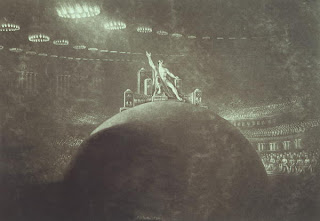 |
| Looney Tunes, "Devil's Feud Cake" |
 |
| South Park |
We often see Satan as a malicious force of temptation and evil, with red skin, horns, a goatee, and impeccable skills on the fiddle. Despite Dante's rather ingenious way of showing how internally weak the Devil is, he's always coniving in popular culture.
John Milton's 15th Century epic Paradise Lost speaks from Lucifer's point of view for a fair stretch of the tale. Satan is presented as a tragic hero, though still antagonistic. If that sounds really risky for an author to do, well it is. Satan's part of the story is about his unsuccessful rebellion in Heaven and sub sequent rallying of the Dark Angels in Pandaemonium. Lucifer leads his men from the front lines and rallies them with his power over the spoken word just as well as epic protagonists like Odysseus. If Milton's verses on the "behind the scenes" of God's will parallel with Dante's, then this portrayal of Satan polarizes them equally. It has also raised quite a stir among scholars, as they debate the meaning behind Milton's words. 20
Satan in Paradise Lost


